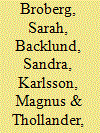| Srl | Item |
| 1 |
ID:
116954


|
|
|
|
|
| Publication |
2012.
|
| Summary/Abstract |
In order to reach the EU: s 20-20-20 primary energy savings target, energy efficiency needs to increase. Previous research on energy use and energy efficiency has focused mainly on the diffusion of energy efficient technologies. The discrepancy between optimal and actual implementation of energy efficient technologies has been illustrated in numerous articles and is often referred to as the energy efficiency gap. However, efficient technologies are not the only ways to increase energy efficiency. Empirical studies have found that a cost-effective way to improve energy efficiency is to combine investments in energy-efficient technologies with continuous energy management practices. By including energy management into an estimated energy efficiency potential this paper introduces an extended energy efficiency gap, mainly in manufacturing industries and the commercial sector. The inclusion of energy management components in future energy policy will play an important role if the energy savings targets for 2020, and later 2050, are to be met in the EU.
|
|
|
|
|
|
|
|
|
|
|
|
|
|
|
|
| 2 |
ID:
116946


|
|
|
|
|
| Publication |
2012.
|
| Summary/Abstract |
Using industrial excess heat in District Heating (DH) networks reduces the need for primary energy and is considered efficient resource use. The conditions of Swedish DH markets are under political discussion in the Third Party Access (TPA) proposal, which would facilitate the delivery of firms' industrial excess heat to DH networks. This paper estimates and discusses the untapped potential for excess heat deliveries to DH networks and considers whether the realization of this potential would be affected by altered DH market conditions. The results identify untapped potential for industrial excess heat deliveries, and calculations based on estimated investment costs and revenues indicate that realizing the TPA proposal could enable profitable excess heat investments.
|
|
|
|
|
|
|
|
|
|
|
|
|
|
|
|
| 3 |
ID:
111438


|
|
|
|
|
| Publication |
2012.
|
| Summary/Abstract |
The impact of global climate change due to increased emissions of greenhouse gases emissions which in turn is a consequence of in particular, the use of fossil fuels, has made EU decision makers to act decisively, e.g. the EU 2020 primary energy target of reducing primary energy use with 20% from 2005 to 2020. The aim of this paper is to present major challenges related to the development and formation of energy policies towards the Swedish industrial and building sector in order to fulfill the EU 2020 primary energy target. This paper is approaching the presented challenges by introducing the theory of Asymmetric Energy Policy Shocks (AEPSs), and addresses some key challenges which are of particular relevance for the fulfilment of the EU 2020 primary energy target for Member States like Sweden which from an energy end-use perspective substantially differs from the EU-25's energy end-use structure. In conclusion, overcoming AEPSs, and moving towards a more Long-Term Energy Policy Approach (LTEPA) will be of key importance for individual Member States, if the 2020 primary energy target is to be fulfilled.
|
|
|
|
|
|
|
|
|
|
|
|
|
|
|
|